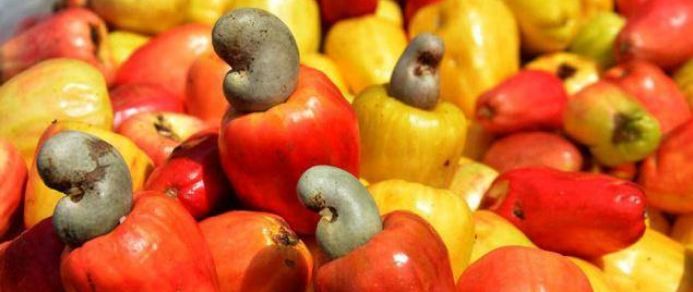04/12/20
Cashew Nuts Exportation Processes From Nigeria - By Bdhi Export

Currently, the major cashew producing countries are Vietnam, Nigeria, India, and the Ivory Coast.
Cashew producing states in Nigeria are:
Kaduna, Abia, Kogi, Enugu, Kwara, Oyo, Niger, Imo, and Abuja FCT.
It takes a cashew plant about 2-3 years to grow from seed, with the tree first developing a drupe, it later develops into a cashew apple from the small stalk bearing the drupe.
The fruit which is the cashew apple also bears a single seed known as the cashew nut. Unlike the cashew fruit which can be eaten when plucked, the nut can’t be eaten unless after being roasted because it contains a toxin that can only be destroyed by smoke or fire.
It’s very nutritional as it a good source of protein and contains also selenium, manganese, copper, phosphorus, magnesium, iron, and vitamin B6.
Consumption of cashew and its nuts can greatly help in weight management, prevention of gall stones, bone development and prevention of bone diseases, reduction of heart diseases, and numerous health benefits.
Cashew Nut Trading in Nigeria
Cashew nut is cultivated in some parts of Africa and, Nigeria is one of the highest exporters of cashew nut in Africa. Areas like Ogbomosho, Ilorin, Oyo, Anyigba, Enugu, Lafia, Keffi are the states that produce cashew in Nigeria.
It is either exported as raw cashew nut, i.e. in-shell, or as processed cashew nut kernel in special packaging like cartons or steel cover containers.
Most raw cashew nut is exported to India and Vietnam while the processed cashew kernel is exported to Europe and America being the largest consumer in the world.
The crop season in Nigeria is from February - May. But trading is usually all year round; some traders usually store the raw cashew nuts and sell when it is out of season and scarce.
Handling Process
A raw cashew nut that looks good on the outside may have a bad kernel inside.
The yield of the kernels, percentage of defective, the average size of the nuts and moisture content are used to determine the quality of the nuts, which usually determines the price a buyer may offer for any raw cashew nut.
Hence effort should be made to improve or conserve the expected good quality derived from proper handling.
The Following Good Process Practice Can Help To Improve Quality of Cashew Nuts
Do not harvest or pluck unripe cashew nuts because the kernel may be shriveled or immature. Hence, only mature and ripe cashew nuts should be harvested and this is done daily.
Do not let the nuts remain on the ground for more than a day before gathering to avoid long contact with soil moisture, sprouting, and deterioration.
Sundry the harvested nuts as soon as possible for two or three days depending on the intensity of the sun.
Sundry on a clean surface and should be lightly spread (not higher than 3 inches) and turned regularly to allow uniform dryness.
Use only jute bags to bag raw cashew nuts.
Do not heap it un-bagged or in plastic containers to avoid deterioration especially if not properly dried.
Do not bag it in polypropylene bags.
Quality Standard
Cashew nuts meant for export must be thoroughly dry and reasonably free from extraneous matter such as sticks, stalks, and other vegetable matter other than cashew nuts. It must also be free from stones.
Total impurities (stones, sticks, stalks, and other vegetable matter) shall not exceed 0.5% of the 1kg sample analyzed.
Nut Counts:
170 – 180 ……………… Excellent
181 – 190 ………………Very Good
191 – 200 ………………Good
201 – 210 ………………Middle
211 – 220 ………………Low Middle
221 – 230 ………………Limit Acceptable
Above 230 ………………Poor
Note: 170 - 210 nut count is usually the benchmark for exporting raw cashew nuts. But some importers may not be willing to buy RCN that is above 200 nut counts.
In Nigeria, the nut count per 1kg sample varies from zone to zone. While zones like
Ogbomosho has between 170 and 180/185,
Kogi has between - 190 to 205/210, Ondo has between - 190 to 205/210, Ilorin has between - 190 to 205, Lafia/Keffi has between - 200 to 210, Enugu has between 180-200nut counts, etc.
Moisture
Exportable quality shall not be more than 10%. You have to make sure the raw cashew nuts are properly sundried and the moisture content must be properly analyzed.
Kernel Out-turn Ratio (KOR)
This is the quality of good nut we get from 80kg of raw cashew nuts. The count is in pound per 80kg.
KOR Remarks
48 – 55 … Excellent
45 – 47 … Good
40 – 44 … Average
Below 40 … Low/poor
Defectives
Diseased or mouldy - shall include all nuts which when cut reveal the presence of fungi growth or a milky patch or a spread of brown or black spot on the split kernel.
This is often caused by high moisture for several days prior to proper dryings, wrong packing, and improper storage.
Void - these are nuts that show the absence of kernel, emptiness, or absence of a kernel of useful size. This is probably caused by natural malformation.
Immature/Shriveled - shall include all nuts which when cut contain space between the kernel and the shell, shrink or contain kernel that is not fully developed. This is caused by harvesting immature nuts.
Spotted - shall include all nuts which show the presence of a black or brown spot on the kernel. This is caused by insect bites at the early stages of the development of the nuts.
Check test for Quality
Carrying out a quality check test on cashew nuts like every other agricultural export produce begins with proper sampling.
Samples shall be drawn from not less than 30% of consignment, the sample shall be properly mixed, reduced, and from which 1kg sample is drawn for analysis which includes moisture, nut count, detectives, and finally KOR.
Guide to Harvesting and Post-Harvest Handling of Cashew Nuts
Cashew is generally cultivated for the raw cashew nuts in Nigeria. Mature cashew trees normally start flowering in late November to December. The fruit matures in 90 – 100 days after flowering.
The ripe fruits normally start to drop in late January, the peak fruit collection period is between mid-February and mid-April.
It is important to remember that the excellence and thoroughness of post-harvest handling affect the quality of the product and thus bring better prices to farmers.
